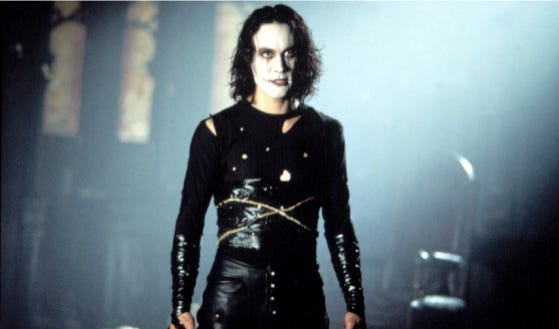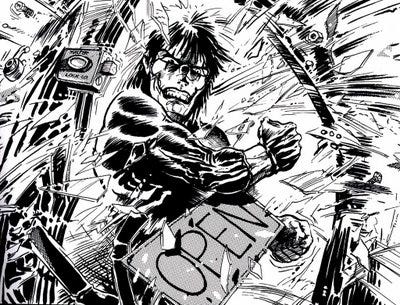The Crow (1994)

Comic-book films are commonplace now, with multiple superheroes making their way to the big screen every year. This year, for example, saw the release of “X-Men: First Class,” “Thor,” “Green Lantern,” “Captain America: The First Avenger” and a few others I may be forgetting. With the current abundance of superhero films, audiences are growing numb to their effects. But in the '90s, comic book movies were rare enough to make an impact.
1994’s “The Crow” was one of those films, rippling the waters of the then-shallow pool of comic-book adaptations.
Several critics, including the beloved Roger Ebert, praised the film’s dark poetic realism and gothic atmosphere. They also recognized a certain poignancy rarely found in films of its genre.
“The Crow” is a tale steeped in tragedy and sorrow. Written after writer-artist James O’Barr’s girlfriend suffered an untimely death at the hands of a drunk driver, the comic book is a love letter. And the screen adaptation is the swan song of its star Brandon Lee, who died tragically while making the film at the tender age of 28.
“The Crow” follows Detroit rocker Eric Draven (Lee), who rises from the dead to exact revenge upon the thugs that killed him and his fiancée. The titular bird raises his spirit and guides him through the city’s underworld in search of the killers.
O’Barr created Draven as a coping mechanism to deal with his own girlfriend’s death. His passion, pain, and subsequent catharsis courses through every frame of the film and panel of the comic book.

Its history may be shrouded in death, but the film pulsates with life. It moves at an exhilarating, rapid-fire pace, unfurling at the rate of Eric’s rage. When I saw it as an adolescent, it seemed to slumber like a zombie, as I found myself drowning in the grim muck of the film’s decaying urban setting. Now, in the wake of "The Dark Knight," “The Crow’s” grounding in harsh reality is much less jarring. What remains completely unsettling, though, is the posthumous appearance of Brandon Lee.
When Lee’s character rises from the grave and gasps for air, you, too, will have to catch your breath. As most know by now, Lee died during the last weeks of production when the metal tip of a dummy bullet was unknowingly lodged in a prop gun and shot into his abdomen. The juxtaposition of Lee's death and his character's resurrection roots the film in mysticism. The movie feels like an ethereal, otherworldly force — a message from the beyond. With his face painted ghostly white, Lee’s avenger character is a powerful, haunting specter.
When I was much younger, I thought critics overstated Lee’s performance in respect of his memory. But after recently re-watching the film, I realize that he is simply, sadly brilliant in the role. As Eric, he strikes a perfect balance between post-resurrection exuberance and fierce determination to exact revenge. It’s an energetic performance pulsing with wit and pathos. If you want proof, watch this scene: [youtube http://www.youtube.com/watch?v=OxkFWCn_-FE&w=520&h=315]
After starring in a few forgettable action flicks (“Showdown in Little Tokyo,” “Rapid Fire”), Lee was ready to step out of the shadow cast by his father, Bruce Lee. And in “The Crow,” he emerged and stood on his own as a major talent. It’s a true shame that such a promising career was cut short.
“The Crow” was just the beginning of director Alex Proyas’ career as well. Proyas, who went on to direct “Dark City” and “I, Robot,” infuses the film with a gothic sensibility and surreal visual style. It’s like an Edgar Allan Poe poem brought to vivid life — the manifestation of his tortured soul.
Although inspired by “Batman,” “Blade Runner,” the Goth music scene of the '80s, and Robert Smith’s wardrobe, the film’s design stands as a work unto itself. Rich and moody, it depicts Detroit as the stark, crumbling wasteland that it basically is. The film’s soundtrack (featuring music by the Cure, Nine Inch Nails, Stone Temple Pilots, etc.) is equally evocative and transporting.
Before re-watching and writing about “The Crow,” I was ready to dismiss it as a deeply flawed but occasionally electrifying film worth watching mainly for the poignancy created by Lee’s death. However, I’d now rank it among the best comic-book films of the last 20 years. Poe-meets-punk, this film is an absolute marvel — a fever dream of tragic romance and melancholy wonder and a stunning example of how our most tender emotions can come from the darkest places. Style rarely enhances substance quite like it does in this film. When it comes to films within the comic-book genre, "The Crow" is rarely talked about, so I say we spark the discussion … now.
4 Yaps


